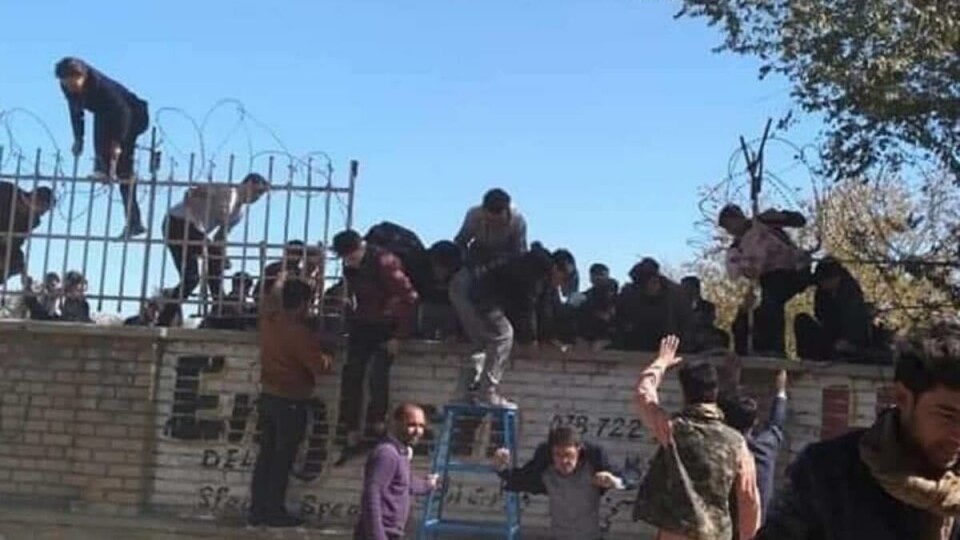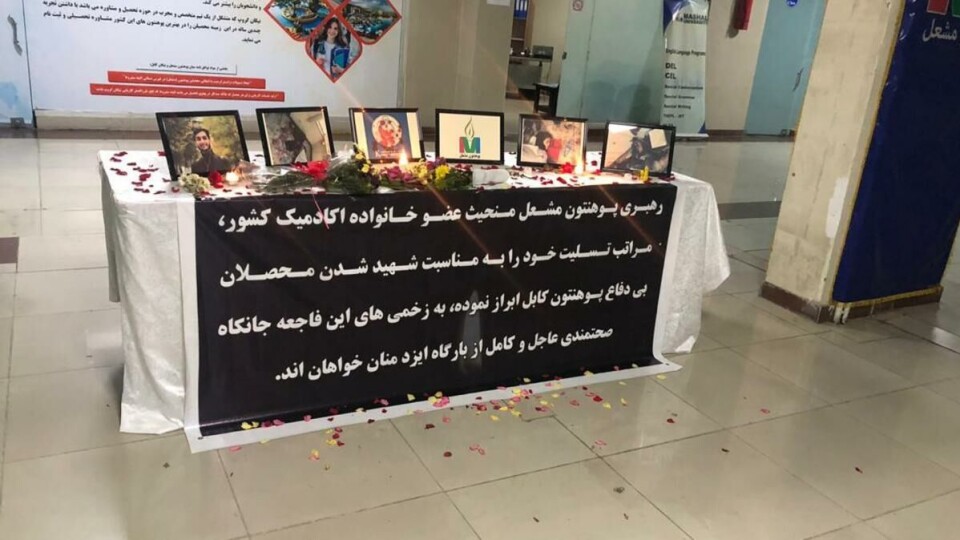Kabul University attack:

— Students' safety can't be guaranteed
Three months after the attack on the university, students are scared to return.
Monday November 2, 2020. The clock had just struck eleven when a bang was heard outside the entrance to Kabul University. The sound is not unfamiliar in the capital, where the sudden sounds of shots and bombs are a part of daily life. Students therefore initially thought it was just that: a normal explosion. Routine.
Shortly after, two masked men entered the building. Dressed in military uniforms, they began shooting. Panicked students hid in the building or jumped from windows to get to safety.
Several played dead among the bodies of their classmates. By the time the attack was stopped by Afghan and US security forces, 35 students were dead. Around 100 were harmed. Several thousand students escaped with their lives. Some of them do not want to return to their studies.
Doesn’t want to go back
One of them is 23-year-old Sheela Ahmadzai. She was in her second year of studying law at the university when the attack occurred.
She tried to hide from the men, but she then fell from a window and injured her foot. She now finds it difficult to talk about that day.
— If I go to the university, I can only remember the attack, she says during a call with Universitas.
— I don’t want to continue studying. I’m scared and I want to be safe.
Now she spends her days at home. She doesn’t know what the future will bring, but she wants to leave the country.
I don’t want to continue studying. I’m scared and I want to be safe
Mohammad Zahir Faizi, the president of the association for students in Afghanistan, says that many are in the same situation.
— It’s a big problem. Many students don’t want to return to the university, he explains.
— The students’ safety can’t be guaranteed. Therefore, they’re not coming back.
Historic peace negotiations
The security situation in Afghanistan has been notoriously unstable for several decades. In 2018, the president of the country, Ashraf Ghani, promised that the Taliban would get unconditional peace talks if they agreed to meet. The Taliban declined. In the following time, however, the US and the Taliban met to talk. They eventually agreed that the great power and NATO allies would withdraw from Afghanistan.
In March 2020, hope was sowed so that the critical condition of the country could begin to dissolve. Members of Afghanistan’s government and the Taliban then travelled to Doha to negotiate. The meeting was described as a historic turning point. The two sides had not met face-to-face since the 9/11 attack. During the course of the year, the two sides met several times – without reaching agreement.

— Significant progress
The uncertainty is still great about whether the two warring sides will find a solution or not.
— It’s a huge slate to clear. But simply them talking together, is significant progress, Arne Strand says.
He’s the vice-director at the Christian Michelsen’s Institute and one of Norway’s leading experts on Afghanistan.
Lately, attacks on civilians in the country have increased. Strand believes this is correlated with there being certain progress in the peace negotiations:
— And with them, some will lose and some will win. There are negotiations at the same time as there is war between the Taliban and government forces.
The uncertainty is also great when it comes to who is actually behind the attacks. The government claims it is Taliban that is targeting civilians with terrorist attacks, to show that the governing power is to weak to protect the people. At the same time, there is speculation that there are opposing groups within the government that are to blame.
Some have earned incredible amounts of money on the conflict. These people can lose in the case of peace. Among them are an elite group of politicians and former warlords, who have earned lots of money on sale of weapons and drugs, Strand says.
— The problem is that no one knows for sure who is behind all the attacks, and when you don’t know, you also don’t know how you can protect yourself, he explains.
Education promotes progress
When talks of lasting peace in Afghanistan is on the table, there are mainly two possible scenarios that are discussed:
Can the conflict be resolved politically? Or does it have to continue until one side is left standing as the victor?
— The last forty years have shown that no one can win the conflict militarily. We have seen periods with 100,000 international soldiers, who could not defeat the Taliban. Then only a political solution is required. But that often takes longer time, Strand explains.
A negotiated solution will not necessarily create peace in the country, he highlights. The reason is that several underlying conflicts are intertwined. But a negotiated solution can reduce violence and civilian losses, if the sides were to come to agreement.
The problem is that no one knows, and when you don’t know, you also don’t know how you can protect yourself
The universities play an important role in pushing the progress further, Strand believes.
— There is such a small proportion of educated residents, who are often those who take the lead in the development, he explains.
— The opportunity boys and girls have to attend universities, creates room for knowledge development in the country, and to secure the wider population’s influence. This is extremely important.
— So how damaging is it when the university is chosen as a target?
— Extremely. Both for the individual, but also because of the doubt it creates about whether the government really wants to protect the students. It is this kind of attack that can contribute to worsening the conflict, by reducing trust.
Many want to leave
Now the attack in November is also hindering the progress of education. Kabul University is temporarily closed. The official reason is that the students need a break. But according to Faizi, the reason behind the closed doors is lack of students.
Many of them want to leave the country. This he understands. At the same time, he is frustrated over how the country will break the circle of violence and power struggles – without education as a foundation.
— If everyone leaves the country, there will be an even greater lack of professors, economists, doctors … How can we rebuild the country if everyone leaves? How can we then continue? He asks.
— Lack of education is already a big problem here in Afghanistan. Now it’s getting even worse.































